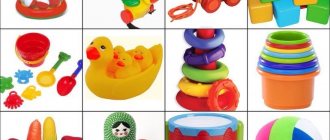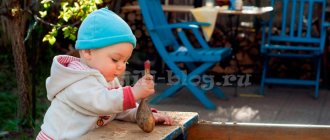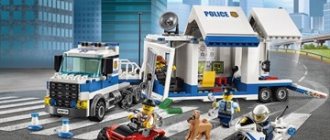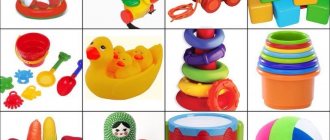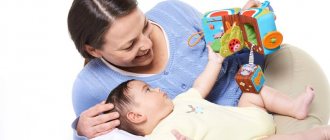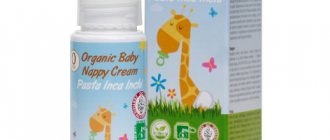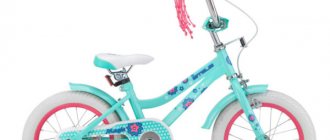At what age can you start rustling pages?
- At 2-3 months - only acquaintance with the book. The baby is already looking around with interest and listening to his mother’s gentle voice. Naturally, a child at this age will not be able to understand fairy tales, and will not listen to his mother with genuine interest. Therefore, the book should be contrasting, soft and with as simple black and white pictures as possible, and mother will come up with rhymes and jokes as comments to the picture herself.
- At 4-5 months - a new “book” stage. Now you can buy soft (and safe!) bath books, as well as the first cardboard books with large images and short (1 word per picture) text. Be sure to accompany your viewing of the pictures with children’s poems or nursery rhymes “on the topic.”
- At 9-10 months, the child already listens to his mother with pleasure. It's time to buy "Turnip", "Rock-Rock Hen" and other children's bestsellers. Thick “folio” books are not recommended. Buy small books that are easy for your baby to hold and flip through.
- By 11-12 months, the baby can no longer do without books, and at the first opportunity he shoves another literary masterpiece about “our Tanya”, animals or Teremok into his mother’s hands. Don't dismiss your child - read until he gets bored. By instilling an interest in books, you make a serious contribution to its development.
How to choose an Early Childhood Development Center for your baby - all the tips.
What books can a mother read to a baby under 1 year old?
A selection of books for children from 0 to 1 year old
I’m simply obsessed with books; even before the birth of my first son, I bought children’s books in series and read them to my belly. By now, a very large collection has accumulated and already occupies 3 shelves, but I don’t stop there. We love reading as a family. My husband reads a lot on his tablet, but you can often see him with a book, especially on vacation, it’s so nice to lie on a sun lounger with a book in your hand.
My reference books now are collections on early childhood development and books on caring for babies. The smallest children, I believe, need various books - cardboard, with opening windows, with moving elements, musical, with tactile inserts, lullabies, with rhymes (Barto, Marshak, Chukovsky), with fairy tales (Turnip, Kolobok, Teremok, etc.) , panoramic books, books for bathing in the bath, books with magnets, stickers, puzzles, eyes and much more. So, our selection for the little ones (from 0 to 1 year): 1. “Montessori Home School” (view in the Labyrinth: https://www.labirint.ru/books/122593/?p=9551) is a guide for young mothers for classes with their children according to the methods of the Italian teacher Maria Montessori
2. “Shapes” - a book with opening windows, very exciting for a child. view in My-shop.ru
3. “On the Farm” - a book with tactile inserts made of various materials, helps the development of fingers.
4. “In the Sea” - a book with very hard large puzzles that are assembled in a chain, introduces the baby to the inhabitants of the sea (dolphin, octopus, fish and others), a book with poems and a fun game see My-shop.ru
5. “Woof! Woof” - a panoramic book about a cheerful puppy who woke up all the animals on the farm, helps to recognize the animals and who says what
Woof! Woof! view in My-shop.ru
6. Agnia Barto. The poems are children's classics, there are a lot of collections and these are the most favorite poems for both my sons
view the book in My-shop.ru
7. Educational games for kids look at My-shop.ru > - also a collection for mom
8. “Bayushki, bayu” - a collection of lullabies (and we have a lot of them) View in the Labyrinth: www.labirint.ru/books/32208/?p=9551 view in My-shop.ru
9. Songs from cartoons, a very good collection with the lyrics of the most favorite songs. I really like to sing children’s songs and my eldest son is already singing along, but the youngest son is still listening. View in the Labyrinth www.labirint.ru/books/109353/?p=9551
view in My-shop.ru
10. “My first knowledge” - a book with the characters of the beloved Winnie the Pooh with a musical block, teaches shapes, colors, counting, etc. view in My-shop.ru
11. “School of the Seven Dwarfs” series from 0 to a year. A very good guide, for each year of life there are 12 albums, a system for up to 7 years. For the little ones, these are albums with very large pictures, rhymes, with small tasks, there are pages for parents - how and what to do with the child, there are lessons on massage and more. Mothers familiar with this technique note the good abilities of their children. View in the Labyrinth: www.labirint.ru/books/153293/?p=9551 view in My-shop.ru
12. “Book for family reading. From 1 year to 7 years" www.labirint.ru/books/200060/?p=9551 Just a wonderful selection of poems, nursery rhymes, fairy tales, songs by age. We read with great pleasure. The illustrations are bright and large. view in My-shop.ru
13. “Turnip” Rosman cardboard book with very dense oxbows My-shop.ru
14. “Who lives in the jungle? Fisher-Price" book with opening pages on thick cardboard
15. “Soroka-soroka” cardboard book. Publishing house "Children's World". We have a lot of books from this series (Ladushki), about 20, very large bright illustrations, large font for reading. A small child can leaf through and look at cardboard books on his own; some of the books we had were already tried by our eldest son, but I did not allow him to do this, and all the books, in principle, are in good condition. view in My-shop.ru
This short review has not yet included many of our favorite books that will help kids learn about the bright big world around them. The most important thing is the variety of books, the love and attention of the mother, the desire to read together, finding free time for this.
“Rainbow-arc. Songs, nursery rhymes, jokes"
Age: up to 3 years.
The ideal book for the first steps in reading is a masterpiece of children's book classics. Especially, “complete” with Vasnetsov’s drawings. Fantastic modern edition for kids.
Learn folklore nursery rhymes with your children - help them develop their speech!
By the way, with your child you can watch the best educational cartoons for children under one year old.
Author: Agnia Barto. "I'm growing"
Age: for the little ones.
“The bull is walking, rocking” remember? And “Our Tanya”? And even “the girl is grimy”? Well, of course, remember. Your mother and grandmother read them to you as a child. And now the time has come to read these poems to your children.
A kind and bright book that has not lost its relevance for many generations in a row.
“A book for imperfect parents, or life on a free topic” - I. Mlodik
This book is not a manual for the operation of a device called “child”, it is the reflections and observations of an experienced psychologist working with adults and children, whose destinies, stories and examples can help anyone who wants to raise a happy person who creates their own destiny, it is about , how not to educate, but to live lovingly. The book will be of interest to both parents and everyone who is in one way or another connected with children and childhood problems.
Do you want to be the first to read our materials? Subscribe to our telegram channel, Facebook page, or VKontakte group.
We are at Yandex.Zen - join us!
Author: Korney Chukovsky. "Telephone"
Age: for kids.
A book that should be on every parent's shelf.
A work written back in 1926 that is not outdated to this day. A fairy tale in verse that gave the world many catchphrases - with a fascinating plot, easy rhyme and colorful drawings.
newborn care books
BOOKS FOR FUTURE PARENTS - WHAT A PREGNANT WOMAN AND A FUTURE FATHER MUST READ.
Here are the 10 best books that expectant parents absolutely must read.
1. Jean Ledloff “How to raise a happy child. The principle of continuity"
This book was published back in 1975, but to this day has not lost its relevance. It is best to read this book before giving birth, as it will completely change the way you think about the essentials of life for a baby. Here you can learn about what most contributes to the development of a creative, happy and friendly personality, and what a civilized society can bring up in a child.
2. Martha and William Sears "Waiting for Baby"
This is one of the best books for women expecting their first child. It describes all the months of pregnancy very well and clearly, contains answers to the most frequently asked questions, as well as useful tips on how to properly prepare for childbirth.
3. Martha and William Sears "Your Baby from Birth to Two Years"
This book is a continuation of the previous one. A young mother and child were taken from the maternity hospital. And parents immediately have a lot of questions: “How to feed? How to put to bed? How to raise your child? How can you understand what a child wants if he is crying? You will find the answer to all these questions, as well as much other useful information, in this book. The authors of the book are parents of eight children, so they can teach modern parents a lot.
4. Grantley Dick-Reed “Childbirth without fear”
Many pregnant women are afraid of natural childbirth. The author of the book claims that this process can be absolutely painless. The most important thing is the correct physical and moral preparation of a pregnant woman for natural childbirth. In the book you will find the most effective relaxation techniques and learn how to enlist the support of your husband. And all modern horror stories about childbirth will be dispelled.
5. Ingrid Bauer “Life without diapers”
The author of the book promotes natural methods of child care. This is one of the most important books about the Planting. The book describes the idea of giving up diapers entirely. And you can achieve this by establishing a harmonious relationship with your baby. This way you will learn to feel his desires even from a distance.
6. Zhanna Tsaregradskaya “Child from conception to one year”
This is the first manual on perinatal education published in Russia. The author of the book is the founder and mother of seven children. This book is a great help for young mothers. After all, it describes the baby’s life month by month, his behavior during natural feeding, the frequency of feedings, the daily rhythm of sleep, the introduction of complementary foods, the development of the relationship between mother and child. Also in this book you will find very interesting chapters on the psychology of newborns and natural childbirth.
7. Evgeny Komarovsky “The health of the child and the common sense of his relatives”
The famous pediatrician Evgeny Komarovsky has published more than one book on child care, but this one is the most applied. It describes in detail and in accessible language the author’s opinion on a variety of issues. In his book, the author urges parents to carefully weigh any decision regarding their child and not go to extremes. Parents do not always agree with the opinion of this doctor, but we still recommend reading the book.
8. Janusz Korczak “How to Love a Child”
This book can be called a kind of bible for parents. Here you will not find answers to specific questions or advice on what to do in a given situation. The author is an excellent child psychologist, and in his book he reveals the motives of children’s actions and their deep experiences. Only when parents try to understand all the intricacies of shaping the child’s personality will they learn to truly love him.
9. Julia Gippenreiter “Communicate with the child. How?"
This book will help you not only learn to hear your child, but also establish communication with friends and acquaintances. It will change your views on the relationship between children and parents. Thanks to it, you can find and correct many common errors. This book is intended for working on yourself, because children are a reflection of their parents.
10. Alexander Kotok “Vaccinations in questions and answers for thinking parents”
In this book you will find accessible information about childhood infectious diseases and vaccinations against them. The author reveals all the negative and positive aspects of mass vaccination. After reading the book and weighing the pros and cons, you can make an informed decision about whether and which vaccines your child should have.
Author: Korney Chukovsky. "Stolen Sun"
Age: up to 3 years.
One of the most famous and, despite the age of the fairy tale (approx. - since 1927), still popular stories in verse about the sun swallowed by a crocodile.
A favorite fairy tale of all little ones with a rhythm close to children, easy learning by heart, and wonderful images of the characters.
Author: Korney Chukovsky. "Fedorino grief"
Age: up to 3 years.
If you have cockroaches and all the dishes have run away, then it’s time to be treated for laziness and sloppiness!
An instructive and fun story for little ones with a fast-paced plot, light style, sonorous rhyme and a happy ending. A fairy tale that teaches kids cleanliness and order.
Author: Samuel Marshak. "Poems and fairy tales for the little ones"
Age: up to 3 years.
Discovering the wonderful world of Marshak, kids get acquainted with riddles, instructive and mischievous poems, songs and fairy tales. This book contains the author's best works with colorful illustrations - Children in a Cage, Merry ABC and Robin Bobbin, Humpty Dumpty, King Pepin and many others.
Warm and cozy book for toddlers.
Child development and education: the best books for parents. Review
…One day a young mother came to A.S. Makarenko and asked at what age should she start raising a child. — How old is your child? - Anton Semenovich asked. - He is only three weeks old. - Well... You're exactly three weeks late. L. Panteleev. “Our Masha. Book for parents"
If you collect in one book all the questions that torment young parents, you will get a volume that is not inferior in thickness to the paper edition of Wikipedia. And, as you know, it contains five thousand pages. And all of them are constantly spinning in the heads of unhappy mothers and fathers! How not to get exhausted trying to deal with all the problems at once?
With the birth of a child, not only joy comes to the house, but also many worries. An active period is coming for both parents - they will have to take care of the new person, devote time and energy to him, help him discover the world... It seems that primary school is still far away, and the teenage period is full of storms and pitfalls, but - as both mothers and specialists believe child psychology - how to think about the future needs to start from the first months of a baby’s life. Quoting the author of one of the most popular early development methods, Masaru Ibuku: after three it’s too late!
From the moment of birth, you must constantly closely monitor the child’s health and behavior: proper nutrition, sleep, exercise. Sometimes an answer to a question is required immediately. Just thirty years ago, perhaps only books by Dr. Benjamin Spock . Dr. Spock used his experience in pediatrics and psychoanalysis to create manuals for parents, which together cover issues of child health, nutrition, and communication. The book “Child and Child Care” remains in demand to this day, although many of the tips have lost their relevance over the years (it was first published in 1946). But it won’t hurt to have it on the shelf even in the 21st century.
Most modern authors do not deny Spock's experience, but rather rework it to suit new living conditions. As a rule, they pay attention to issues of both physiology and growth, as well as psychology and development of the child. William and Martha Sears , a married couple and parents of eight children, have created an entire library of books for parents, using their life and medical experience. In their books you can find practical advice on caring for children and communicating with them for each stage of a child’s growing up.
, Evgeny Komarovsky writes most fully about child care . The book “The Health of a Child and the Common Sense of His Relatives” combines advice on arranging a child’s life, a detailed story about possible diseases and dangers, and at the same time recommendations on strengthening the nervous system of parents. In addition, Komarovsky is the author of a series of “Reference Books for Sensible Parents ,” designed to help parents in the prevention and treatment of childhood infections.
But not only health is important. At some point, it is easy to fall into the misconception that the power of parental love and attention is enough to raise an ideal child. But any extremes, as we know, are dangerous - and developing a harmonious approach on your own is not easy. There are many extremes - allowing the baby to do whatever he wants for the time being; on the contrary, from the cradle he should be taught letters and syllables, so that by the age of five he can independently read Bazhov and Lindgren; From childhood, immerse him in the world of sports, cultivating a healthy mind in a healthy body... Methods developed by pediatricians and psychologists will help not to overdo it and organically instill in a child the necessary skills. In some ways they overlap with each other, in others they categorically disagree. Each of them focuses on something different: health, reading, fine motor skills. When choosing one method or another, it is worth remembering that applying strict requirements to a child is, to say the least, wrong. Each baby has its own pace of development and knowledge of the world. In any case, you will have to stock up on patience, fortitude and available materials.
Children are extremely receptive to learning, and with the right approach, you can understand very early what the child is more predisposed to - physical activity, communication, creativity. Maria Montessori's method is perfect for this . She suggests creating a special learning “environment” for the child (placing various objects and materials in a large space) and allowing him to independently choose what is more interesting to him. It is worth noting that this method is more suitable for classes of teachers with groups and primarily involves the development of independence, logic, and attentiveness, and not, for example, previously teaching reading and counting.
method (“Harmonious development of the child”) , on the contrary, is focused specifically on the activities of parents with their child, and it is the parents who have the most active role here. The exercises developed by Doman perfectly train memory and give the child a huge base of knowledge in the first years of life. Doman suggests using cards with various facts from the field of geography, history, biology for learning, and also teaching reading and counting from the first months.
“Believe in your child” by Cecile Lupan , one of the most famous mothers in the world, is also addressed to parents Her technique is based on attention to your child, the gradual disclosure of his individual potential, and advice or exercises vary depending on what the child is interested in. Lupan turns learning into a game: reading through singing letters to the tune of children's songs, counting through comic riddles. The main thing is not to force your child to study according to a strict schedule and not to achieve efficiency at any cost.
Russian teachers have developed entire sets of games designed to develop a child’s creative abilities and thinking. For example, puzzles by Boris and Elena Nikitin , which train a child’s logic and imaginative thinking ( “Intellectual Games” by B. Nikitin), or cubes with numbers and letters by Nikolai Zaitsev , which come with a detailed “operating manual”: you can chant syllables or add words, refer to tables of syllables (there are also separate ones for arithmetic). Children trained using this method can read independently by the age of four, and can count to one hundred by the age of five.
Of course, interest in a book cannot be instilled only with the help of cubes and tables. Children's publications - with colorful illustrations, simple and sonorous rhymes, and also "indestructible", that is, able to withstand the active interest of children - are an integral arsenal of parents who want to develop a love of reading in their children. Fortunately, there are books that not only combine clear and bright pictures with riddles and fairy tales, but are also created from environmentally friendly materials. Turning reading into a fun game with puzzles or cardboard inserts, or even “literary swimming,” immediately draws attention to the process.
There are many original methods for teaching reading. The book “Teaching a Child to Read” by Valery Marusyak offers a series of games and fun activities with which you can gradually introduce your child to reading, without discouraging him from holding a book in his hands at all. We are talking mostly about older children, four to six years old, so this technique is suitable for parents who believe that rushing things is harmful for the child. The application contains many practical preparations, and the tasks themselves touch on all aspects of development that are important for a child - sensory, motor, and speech development. The author, a professional teacher, also cites the most common mistakes made by inexperienced parents who want to send their child to school already reading, and tells how to avoid them.
However, the formation of worldview and personal qualities is still determined to a greater extent not by how early he learns to read and count, but by the environment that surrounds the child. In order not to face unpleasant consequences - emotional instability or mistrust, it is important for parents to control all aspects of interaction with their children. Masaru Ibuka (“After Three It’s Too Late”) , founder of Sony and author of one of the most popular early development methods, offers a unique system that affects various aspects of a child’s life, from daily routine to awakening interest in art. He places the emphasis not on skills, but on the education of feelings and moral qualities, and insists that it is important to encourage imagination and support creative endeavors. Ibuka emphasizes that there is no thing “too difficult” for children - if they are not ready to understand something, they simply do not pay attention to it.
How to explain to a child what is possible and what is not, without awakening resentment and achieving your goal? How to react to tears or withdrawal, how, finally, to talk about what adults themselves have difficulty imagining?
In addition to overwhelming works on child psychology, there are many books in which parents can find the answer to the main question: how to understand their child? Among them, for example, “Little Children and Their Mothers” and “Conversation with Parents” by English psychoanalyst Donald Winnicott , which clearly reflect the importance of the psychological attachment of children and parents and allow one to avoid problems in communication. “The Book for Non-Ideal Parents” by practicing psychologist Irina Mlodik is dedicated to describing the age-related characteristics of children and the factors influencing their feelings and desires. Fans of modern American popular psychology will be interested in learning about John Gray’s in the book “Children from Heaven ,” and you can get acquainted with the practice by reading Elena Nikolaeva’s book “111 Tales of Child Psychologists .
Many useful recommendations and advice can be found in the book of the famous writer, psychotherapist and psychologist Vladimir Levi “Non-standard child” . How to avoid disobedience, how not to spoil a child without making him feel unwanted and unloved, how to survive adolescence - Levi shares professional secrets with parents, but does not urge parents to follow any clear upbringing scheme. This, of course, simply does not exist.
The main thing that mothers and fathers will have to come to terms with is that it is not only the child who will have to learn. In the book “Raising a Child? Or yourself? practicing psychologist Svetlana Ievleva invites parents to think about why children behave this way and not otherwise, and how to get out of a difficult situation. After all, it is the parents who ultimately determine how the child adapts to independent life after many years. She examines all periods of growing up - from birth to school age - and provides detailed comments on everyday situations, which, it turns out, sometimes play a greater role than it seems at first glance.
Children tend to baffle adults, and sometimes their ingenuity amazes them. Finding the correct and understandable answer is sometimes not so easy. You need to look at the world through the eyes of a child - and discover a different logic and new laws of reality, different from an adult’s. Books by Adele Faber and Elaine Mazlish (“How to talk so that children will listen, and listen so that children will talk”) , American psychologist and teacher Eda Le Chan (“When your child drives you crazy”) , and our compatriot Julia Gippenreiter (“Communicate with a child. How?”) Brett Doris wrote a book “Once upon a time there was a girl like you” , in which she tells how to help children overcome fears and anxieties, and parents will be instructed in resolving all kinds of conflicts by Ekaterina Murashova (“Your incomprehensible child") and Elena Alekseeva ("How to understand a child") . Children's feelings, behavior patterns, all kinds of phobias - these books will help you find a common language with your child.
There is a lot of literature designed to help parents navigate the children's world. If you are expecting a new addition to your family or there is already a toddler crawling (or even running around) around - get ready to free up space on the shelves!
Author: Samuel Marshak. "Cat house"
Age: for the little ones.
An exciting play by Marshak, loved by many generations, with illustrations by Vasnetsov.
A simple plot presented to young readers with great humor. Continuous action with short lines from the characters, memorable poems and, of course, a happy ending to the tale.
Naturally, there are many more books for children - the choice is truly enormous. But this does not mean that you need to buy them all.
Read your baby his favorite books every day, if he asks you to.
And go back to childhood with him.
